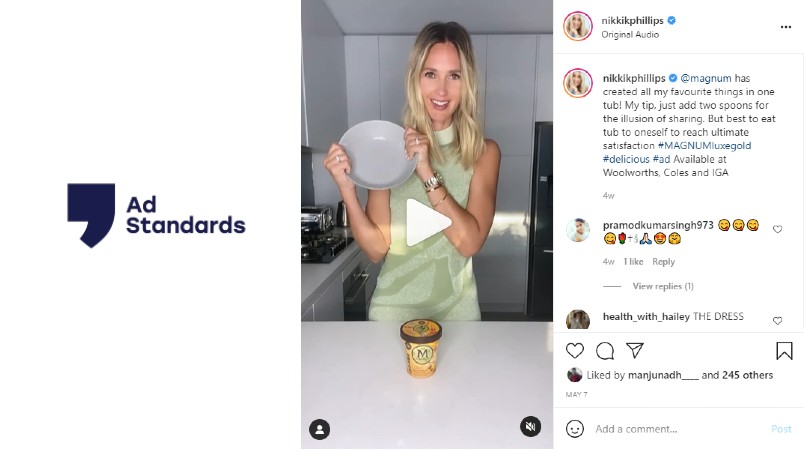Unilever apologises after influencer fails to disclose #ad post

“We apologise for this non-compliance and have advised Nikki Phillips to edit the post clearly to highlight that it is a sponsored post," Unilever said.
In the fourth example of Ad Standards cracking down on influencer marketing following the AANA’s new Code of Ethics, which came into effect in February, Nikki Phillips danced around and enjoyed a tub of Magnum ice cream without saying she’d been paid for it.
What you need to know:
- Influencer Nikki Phillips posted a video of herself eating a tub of ice cream on 7 May without including mention that the post was sponsored, Ad Standards ruled.
- Unilever says: “we acknowledge the original sponsored Instagram post… was not compliant to the AANA Code of Ethics”. They apologised for the misstep, and the post was immediately updated.
- This is the fourth instance of Ad Standards finding fault in how influencers describe paid posts, after one post by Anna Heinrich and two posts by Rozalia Russian.
I scream for a hashtag #ad
Unilever has apologised for breaching the industry’s ethics code after a post by a paid influencer eating Magnum ice cream did not clearly state it was sponsored.
Nikki Phillips, a media personality and model with almost 80,000 followers, shared a short video on 7 May this year of herself with a tub of Magnum Luxe Gold Caramelised Chocolate.
“@magnum has created all my favourite things in one tub! My tip, just add two spoons for the illusion of sharing. But best to eat tub to oneself to reach ultimate satisfaction #MAGNUMluxegold #delicious Available at Woolworths, Coles and IGA,” she wrote in the caption.
After a complaint to Ad Standards that the advertising was not disclosed, the post was quickly updated with the hashtag “#ad” after “#delicious”. Unilever Australasia conceded the post did not meet the Australian Association of National Advertisers’ (AANA) ethical guidelines for distinguishable advertising.
“We acknowledge that the original sponsored Instagram post by our paid Magnum influencer Nikki Phillips on 7 May 2021 was not compliant to the AANA Code of Ethics as the relationship between Unilever and the influencer was not clear,” Unilever wrote.
“We apologise for this non-compliance and have advised Nikki Phillips to edit the post clearly to highlight that it is a sponsored post. The word #ad now appears in the post. We will work with our marketing agency and influencers to ensure they understand the obligations under the AANA Code of Ethics.”
Nikki Phillips is represented by MaxConnectors, which describes itself as Australia’s "number one influencer agency". MaxConnectors has been contacted for a response.
Under Section 2.7 of the Code of Ethics, advertising or marketing communication must “be clearly distinguishable as such”.
“Influencer and affiliate marketing often appears alongside organic/genuine user generated content and is often less obvious to the audience. Where an influencer or affiliate accepts payment of money or free products or services from a brand in exchange for them to promote that brand’s products or services, the relationship must be clear, obvious and upfront to the audience and expressed in a way that is easily understood,” the Code’s Practice Note says.
Not the first breach
The ruling by Ad Standards is the fourth influencer post to have been found to breach the Code since it came into effect on February 1 this year. A post by Anna Heinrich for Runaway The Label and two posts by Rozalia Russian – one for Dough Store and another for Tom Ford fragrance Soleil Blanc – have previously been named by Ad Standards as in breach.
The rules are, in effect, being written by precedent.
Not long after Ad Standards released its ruling over Russian’s first post, that with the Tom Ford fragrance, it was reported that Tom Ford Beauty, managed by Estee Lauder, does “not engage in paid influencer partnerships”. “The post in question was not sponsored,” Estee Lauder told The Age. They did not confirm whether they had supplied the fragrance for free.
As if to clear up the confusion over whether free products constitute payment, in the case of Dough Store, the company said it did not pay Russian for the post but did send her items for free.
Ad Standards ruled that it considered free products to be a form of sponsored post:
“The Panel also noted the advertiser’s response that they have advised her to use the hashtag ‘gifted’ in any future posts,” it wrote.
“The Panel considered that such a request from an advertiser indicates a relationship and that they do have some degree of control over what this influencer might post.
“The Panel determined that the post did meet the definition of advertising. The Panel noted that the Guidance Note to the Code indicates that #gifted would also likely be insufficient.”
